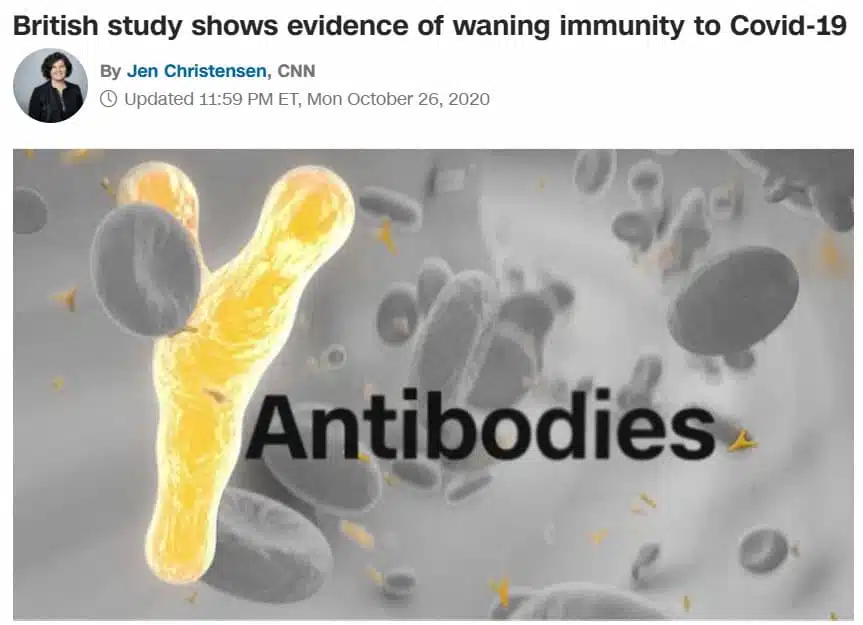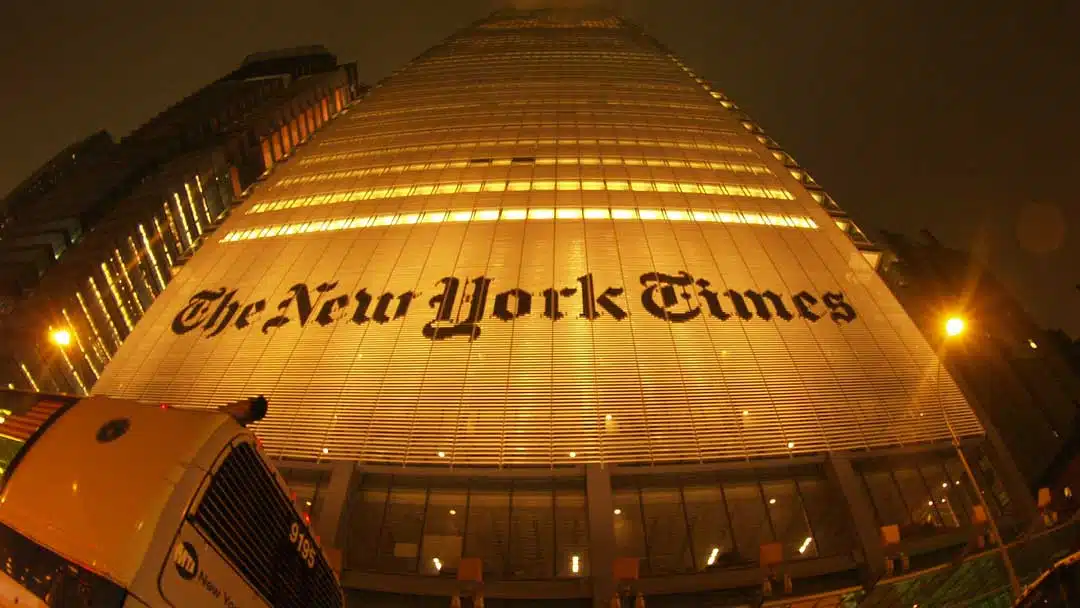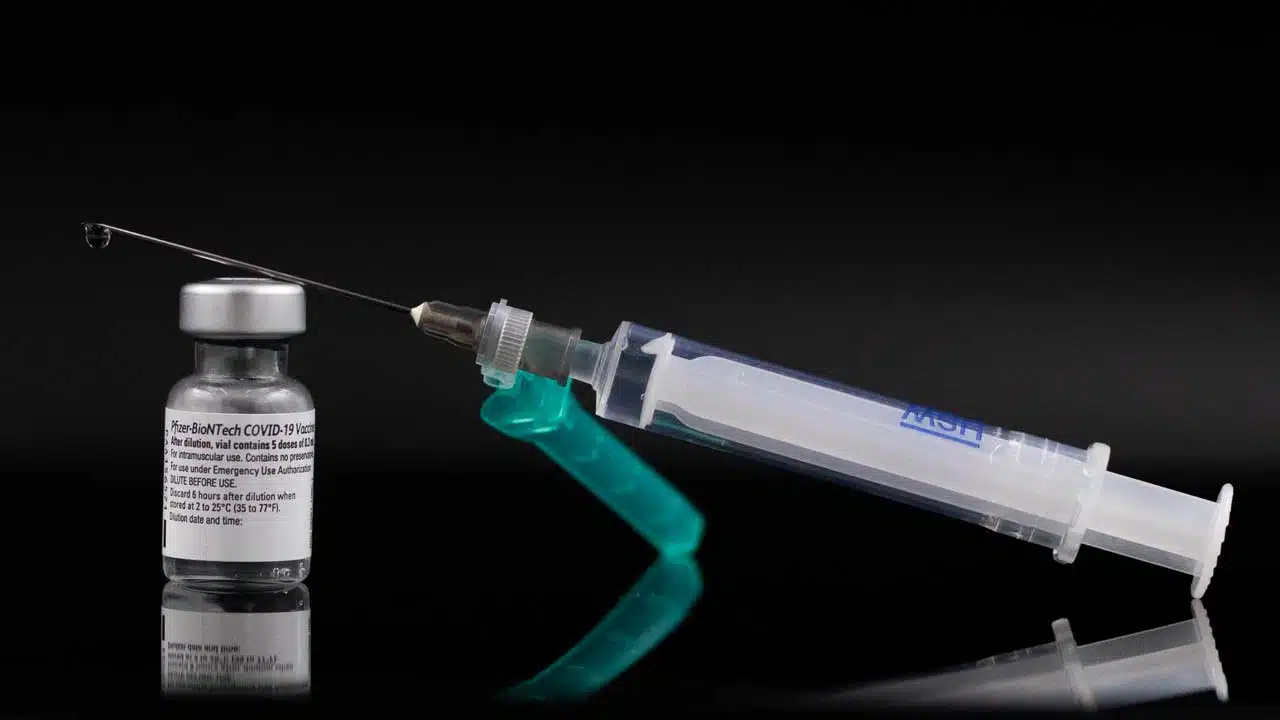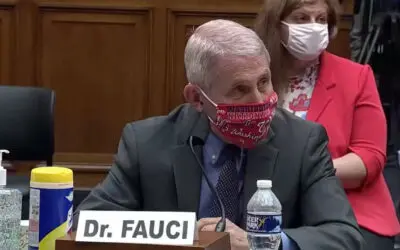This is the fifth of an extensive series of articles about natural immunity to SARS‑CoV‑2 and how it compares to the immunity induced by COVID‑19 vaccines. Links to each installment of the series will be compiled on this overview page as they are published. I highly recommend that you be sure to have read prior installments to get the most out of this one.
Table of Contents
How the Media Deceived about Natural Immunity
In previous articles in this series, we looked at how the public health establishment has been downplaying natural immunity to SARS‑CoV‑2, the coronavirus that causes COVID‑19, by either claiming that it may be weak and short-lived or ignoring it altogether as though immunity could only be acquired through vaccination. In the prior installment, we saw how the false claim that natural immunity wanes rapidly originated while the COVID‑19 vaccines were still under development.
Additionally, we saw glimpses of how scientists whose work and public comments were being used to support that false claim knew that it was untrue. Specifically, the claim was based on the observation of rapidly waning antibodies in the blood of people who had recovered from infection, but the scientists claiming that this was evidence that natural immunity is weak and short-lived knew that this was not so.
Journalists and editors involved in producing alarmist articles propagating the false claim were either too incompetent to be reporting on the subject or were likewise deliberately deceiving the public in furtherance of the political agenda of mass vaccination.
To illustrate that the intentionality of the deception, we need only to understand that basic immunology tells us that rapidly waning antibodies after recovery from infection is normal and does not equal loss of immunity.
Had these scientists and mainstream media outlets been honest, rather than blasting us with fearmongering headlines about rapidly waning natural immunity, they would have educated the public about why the findings of those studies were not a cause for alarm.
The truth was always known to the scientific community. As pointed out in an article published in JAMA Internal Medicine on November 24, 2020, waning antibodies were “neither unexpected nor alarming”. On the contrary, “For all infectious diseases, the waning of antibody titers is normal and does not necessarily indicate the loss of protective long-term immunity.”[1]
Additionally, while the claims of rapidly lost immunity persisted through the fall of 2020, such as in CNN’s October 26 headline “British study shows evidence of waning immunity to Covid-19”, already by midsummer it was recognized within the scientific community that some early findings of disappearing antibodies were mistaken.

False findings occurred due to limitations of the tests being used to detect antibodies in the blood of recovered patients. It mattered which type of antibodies the tests were designed to detect and which part of the virus those antibodies reacted with. Different tests also had different sensitivities.
For instance, a study published on the preprint server medRxiv on July 18 explained that some early findings of rapidly waning antibodies were due to detection of IgG antibodies to the nucleocapsid protein of SARS‑CoV‑2, whereas IgG antibodies to the spike protein were shown to be stabler over time.[2]
A study published at medRxiv on July 20 unsurprisingly found that while IgA and IgM antibodies against the receptor binding domain (RBD) of the spike protein were short-lived, neutralizing IgG antibodies against the RBD, which enables the virus to enter human cells, were stabler.[3]
A study published at medRxiv on July 22 observed that seroprevalence studies, which use antibody tests to estimate the prevalence of infections within a population, were tending to underestimate the infection rate—which in turn resulted in overestimates of the infection fatality rate. The reason for the underestimation of the infection rate was that some of the tests being widely used only detected the more rapidly waning antibodies to the nucleocapsid protein.[4]
In the next article in this series, we will further examine how, contrary to some early reports, later studies showed that antibodies capable of neutralizing SARS‑CoV‑2 before the virus has a chance to enter and replicate inside of human cells are persistent. For our purposes here, however, we will stay more focused on the fact that it was well understood within the scientific community that even if antibodies did disappear from the blood, it would not mean that people were losing their immunity.
In the previous article, we looked at examples of media reports propagating the fearmongering message that waning antibodies meant loss of immunity. It’s worth briefly reviewing those and documenting additional instances of this message being broadcast to the public. Here is a sampling of such articles appearing in July of 2020:
- On July 12, a Guardian headline proclaimed that a study’s finding that antibodies rapidly wane after recovery from infection suggested that natural immunity “could be lost in months”.[5]
- On July 13, a CNN headline similarly proclaimed “Covid‑19 immunity from antibodies may last only months, UK study suggests”.[6]
- On July 13, a Forbes headline proclaimed that “Immunity To Coronavirus May Fade Away Within Weeks”. The finding of rapidly waning antibodies, the article said, meant that “patients who have recovered from Covid‑19 may lose their immunity to the disease within months”, which also “would mean that herd immunity to the coronavirus is likely unachievable.”[7]
- On July 14, a CNBC headline declared that a study finding rapid waning of antibodies meant that natural immunity “may last only a few months”.[8]
- On July 14, a Reuters headline proclaimed that natural immunity wanes swiftly, citing “scientists” who said that studies finding waning of antibodies were “evidence that the body’s immune defence against COVID‑19 may be short-lived”. Specifically, the article quoted Daniel Altmann, a professor of immunology at Imperial College London, saying that waning antibodies suggested that “there could be little immunity” conferred by infection.[9]
- On July 16, the Financial Times reported that the finding of rapidly waning antibodies meant “waning immunity to Covid‑19”.[10]
- On July 16, The Conversation reported that the finding of rapidly waning antibodies suggested that natural immunity “does not last very long at all—as little as two months for some people.” A subheading in the article flatly declared that “Immunity dwindles quickly”. The author further reasoned that “if immunity is short-lived, we will be in an ongoing cycle of endless reinfection”, making herd immunity impossible to achieve without a vaccine.[11]
- On July 17, the San Francisco Chronicle reported that studies showing that antibodies rapidly wane after infection meant that “there may be no lasting immunity to COVID‑19 after people recover.” There was, the article claimed, “a growing chain of evidence that immunity to COVID‑19 is short-lived.” The article further claimed, without citing a source, that the types of antibodies capable of neutralizing the coronavirus were found “in less than 5% of COVID‑19 patients” to begin with. (That, too, was completely untrue, as we will see.)[12]
- On July 24, an NPR headline proclaimed that “Without a Vaccine, Researchers Say, Herd Immunity May Never Be Achieved”. Only a vaccine, the article claimed, could provide “levels of immunity” that would be “high enough to achieve what’s called herd immunity”, which was in part because “antibodies, a key aspect of a person’s immune response, can disappear over a matter of months.” There had been “no scientific proof of reinfections”, but “that may change this fall and winter.” While acknowledging that antibodies “are not the only way the immune system fights a disease”, NPR quoted Neil Ferguson, the lead author of the influential Imperial College London model advocating lockdowns and mass vaccination, saying that waning antibodies indicated that “immunity is only temporary”.[13]
- On July 23, a WebMD article reported that while people who recover from COVID‑19 “seem to develop antibodies that confer some type of immunity”, a study had shown that the levels of those antibodies “drop quickly”— thus leading readers to the conclusion that immunity is therefore quickly lost.[14]
The Initial Propaganda Narrative: Natural Immunity Is Weak, But Vaccines Will Be Better!
Such fearmongering media reports served to manufacture consent for continuing lockdown measures until vaccines then under development could be rapidly deployed. However, the alarmist message had the side-effect of creating widespread doubts about the effectiveness of any vaccine that might be fast-tracked through the regulatory process.
Many people, including in the media, began to reason that if natural immunity was short-lived, then whatever immunity was conferred by vaccination would likely be short-lived, too.
This posed a conundrum for advocates of the lockdowns and their mass vaccination endgame. On one hand, propagating the message that natural immunity was insufficient served to instill the fear necessary to manufacture consent for their adopted political agenda. On the other hand, it was undermining confidence in the idea that their endgame of mass vaccination would be an effective exit strategy.
Therefore, months before the first COVID‑19 vaccine was authorized for emergency use by the US Food and Drug Administration (FDA), proponents of lockdowns and mass vaccination began implanting the idea into the public mind that vaccines would confer immunity that was superior to that conferred by infection.
The Guardian article, for instance, concluded with a quote from Professor Robin Shattock of Imperial College London, who said that the finding of rapidly waning antibodies “does indicate that vaccines need to do better than natural infection”—thus leading readers to believe that natural immunity offered insufficient protection and that scientists would be able to improve upon nature’s design with vaccine technology.[15]
(Recall from the previous article in this series that Imperial College London was itself developing a COVID‑19 vaccine, having received British taxpayer funding for that purpose.)

The CNN article similarly led readers to the conclusion that natural immunity was inadequate by stating that “vaccines will need to be better at inducing high levels of longer lasting antibodies than the natural infection or that doses may need to be repeated to maintain immunity.” [16]
The Reuters article likewise cited “experts” who said that “it does not necessarily follow that waning immunity in natural cases of COVID‑19 infection would be the same with vaccine-induced immune response”. The article quoted Jeffrey Arnold, a visiting professor of microbiology at Oxford University, saying, “If we can, we’d want to improve on nature.”[17]
The Financial Times article quoted Herb Sewell, a professor of immunology at the University of Nottingham, saying, “If the vaccine response drops off like the natural response does, it does mean we’d have to give repeat ones.” The message conveyed to readers was thus that it was a certainty that natural immunity was short-lived.
“Importantly,” the article reassured, “the body does not always respond in the same way to a vaccine as it does to an infection.” Betty Diamond, director of the Feinstein Institutes for Medical Research in New York, was quoted as saying that “there is no reason to assume the immune memory will be the same with vaccines as with natural infection.”[18]
That was certainly true enough: there was no reason to assume that vaccines would provide immunity as robust, broad, and durable as natural immunity has proven to be (as we will explore in great detail in future installments of this series); but, of course, what she meant was that natural immunity was insufficient and that vaccines could provide superior protection.
The Conversation article similarly left readers with the “hope” that “vaccines will give much stronger and longer lasting immune responses to the virus than getting and recovering from COVID‑19 itself. Indeed, the first vaccine candidates from Pfizer and Moderna, reported in early July, show very strong immune responses.”[19]
Likewise, after conveying the message in its lead paragraph that natural immunity fades quickly, the WebMD article concluded by self-contradictorily reassuring readers that “a decline in antibodies doesn’t necessarily mean that protection disappears entirely or that a vaccine won’t be effective.” (Emphasis added.) The final paragraph quoted Buddy Creech, an infectious disease specialist at Vanderbilt University, saying that waning antibodies “shouldn’t dissuade us from pursuing a vaccine” because antibodies “are only a part of the story.”[20]
As discussed in the previous article in this series, savvy news consumers who read past the headlines could pick up on clues that the loss of antibodies did not mean the loss of immunity.
For example, thirteen paragraphs into the twenty-two paragraph CNN article, Dr. Mala Maini, a professor of viral immunology at University College London, was quoted explaining that, “Even if you’re left with no detectable circulating antibodies, that doesn’t necessarily mean you have no protective immunity because you likely have memory immune cells (B and T cells) that can rapidly kick into action to start up a new response if you re-encounter the virus.”[21]
As another example, Forbes included the acknowledgment that the loss of antibodies did not necessarily mean that recovered individuals would be left without protection at the very foot of the article under a subheading describing that admission as a “TANGENT”—as though it was not directly relevant to the fallacious conclusion to which the main body of the article had led readers.[22]
Fears that vaccine-conferred immunity, too, would be short-lived were only in rare instances addressed by rightly challenging the conclusion that natural immunity was short-lived. The truth occasionally slipped through that waning antibodies were not a cause for alarm.
Telling this truth nevertheless continued to serve a propaganda function as such admissions were accompanied by the message that if antibodies induced by a future vaccine were found to wane rapidly, it would not be a reason to doubt the ability of the vaccine to induce strong protection.
The Shifted Propaganda Narrative: Yes, Natural Immunity Might Be Strong, but Vaccines Will Be Even Better!
Such media reports rightly challenging the propaganda narrative about loss of antibodies equaling loss of immunity began appearing by late July in the wake of masses of alarmist headlines.
In The Atlantic on July 20, Derek Thompson provided a rare antidote to “the most depressing headlines” he’d read all year, which had “terrified” him with the message that natural immunity was short-lived. But Thompson, to his credit, did his due diligence by actually reading one of the key studies making headlines—the one by researchers at King’s College London that we discussed in the previous article—and talked to scientists about it, which left him greatly reassured that there was no reason to panic.
As scientists explained to him, the conclusion that immunity is short-lived did not logically follow from the study’s findings. Even if antibodies disappeared, immunologic memory was likely to persist so that antibodies could be rapidly produced again in the event of reexposure. Apart from antibodies, there were also T cells capable of clearing infected cells from the body.
Thompson quoted Eric Topol, the founder and director of the Scripps Research facility, explaining that “To look at just one part of the immune response is woefully incomplete, especially if many COVID patients rely more on T cells.” Topol pointed Thompson to a study showing that “some people recovering from COVID‑19 showed strong T‑cell responses without detectable antibodies.”
(Indeed, as we will examine in further detail, there was already much known about the immune responses to SARS-CoV-2 that was reassuring, but those studies just weren’t making headlines. The media was cherry-picking findings from studies that would serve to instill the fear necessary to manufacture consent for the political agenda.)
Shane Crotty, a virologist with La Jolla Institute for Immunology, told Thompson, “It’s not unusual to have fading antibody response after several months. The drop-off isn’t that surprising.”
Alluding to the fears caused by the alarmist headlines that the immunity induced by any future vaccines would be short-lived, too, Thompson concluded by saying that no study looking only at levels of circulating antibodies “should convince you that a vaccine is doomed and the pandemic will be with us forever.”[23]
Of course, it also did not logically follow from the premise that natural immunity was robust and durable that therefore the immunity induced by vaccines would be, too. But acknowledgements appearing in the media that waning antibodies were no cause for alarm were transparently motivated, in large part if not wholly, by the need to restore faith in the adopted political agenda of mass vaccination.
Hence, a Bloomberg article on July 21 titled “Don’t Get Depressed Over Those Covid Antibody Studies” reassured in its summary sentence that “There’s still a lot of reasons to think a vaccine could create durable immunity to SARS‑CoV‑2.” While acknowledging the fallacy inherent in the alarmist headlines, the article still left readers with the self-contradictory message that “vaccines can induce a stronger immune response than natural infections”—thus still leading readers into the false belief that natural immunity didn’t offer strong protection.[24]
“COVID‑19 antibodies may fade, but vaccine hopes have not”, read the headline of an article in Live Science on July 24. The summary disclosed that “experts agree that there is little cause for alarm and that a vaccine will likely still be successful.” Experts were “not terribly concerned” about studies finding rapid waning of antibody levels and were “balking at the suggestion that this initial data points to risk of reinfection” since “our immune system has other ways of fighting infections besides antibodies.”
It was “normal” for antibody levels to decline over time, the article rightly explained, and even low levels of neutralizing antibodies could be enough to prevent reinfection. Furthermore, even if antibodies disappear, memory B cells that could “ramp up in response to a disease that the body has already encountered” might endure “for decades”.
Additionally, there were T cells that “bind to and kill infected cells”, that could also endure for decades, and that could be sufficient by themselves to clear an infection. “I have seen examples of patients with B cell deficiencies”, Daniel Altmann from Imperial College London disclosed to Live Science, “who recovered from COVID‑19 just fine.”
In other words, individuals who have an impaired ability to produce antibodies nevertheless cleared the infection just as well as individuals without such a deficiency—which demonstrated that a high level of antibodies wasn’t even a necessary component of an effective immune response.
The takeaway message for readers, though, was not that natural immunity was likely to provide strong protection but that we could have faith that the vaccines would provide even stronger immunity. “And even if our natural immune response is subpar,” the article reassured, “a vaccine would be designed to produce a better immune response than natural infection.”
Similarly, Daniel Altmann, despite admitting that antibodies do not equal immunity, still tried to convey the message that natural immunity was inadequate. Attributing the conclusion to Altmann, the article self-contradictorily described the immune responses observed in natural infections as “disappointing”.
That assertion illustrates the cognitive dissonance required to push the propaganda narrative: how could it be true that waning antibodies were normal and no reason to believe that natural immunity was not strongly protective yet also true that the observation of waning antibodies was “disappointing”?
Further, Altmann was also quoted as saying, “The whole point of a well-developed vaccine is to sidestep these limitations [of natural infection] and optimize the vaccine in a way that ensures a robust, long-lasting immune response.” (The clarifying editorial insertion in brackets was Live Science’s.)
The article concluded by quoting Altmann saying, “I would be amazed if waning antibody levels were an issue” with the mRNA vaccines that were then under development.[25]
Thus, the message deceitfully communicated by the article was that it was a certainty that any future vaccine would improve upon nature’s design, that scientists knew everything they needed to know about how immunity worked with SARS‑CoV‑2 to be able make a vaccine that would do better than natural immunity.
The sheer preposterousness of that assertion will be illustrated in future installments of this series.
A particularly dramatic illustration of how the propaganda narrative was shifted to allay concerns that effective vaccines couldn’t be developed was the article published in the San Francisco Chronicle on July 17, originally titled “With coronavirus antibodies fading fast, vaccine hopes fade, too”.
On July 30, the article was updated, with the new headline reading “Studies show coronavirus antibodies may fade fast, raising questions about vaccines”.
The original lead paragraph stated that “Disturbing new revelations that permanent immunity to the coronavirus may not be possible have jeopardized vaccine development and reinforced a decision by scientists at UCSF and affiliated laboratories to focus exclusively on treatments.”
In the updated version, the part about the revelations having “jeopardized vaccine development” was removed and the paragraph changed to say that the scientists had chosen to focus on treatments “rather than vaccines.”
The original described the King’s College London study as “the latest in a growing chain of evidence that immunity to COVID‑19 is short-lived.”
In the updated version, before mentioning that study, the article explained that antibodies “aren’t the only measure of immunity”, and that a vaccine “could also utilize other types of cells that exhibit a ‘memory’ of infection.” A paragraph was added quoting a professor at UCSF explaining that it was normal for antibodies to “become reduced over time”, but what was really important was “whether there are memory B cells induced by the vaccine (or an infection) so that re-exposure to the virus or viral proteins will induce the return of antibodies.” Another paragraph was added explaining that “the human immune system also uses T cells to fight of viruses”, and that “T cell responses may not require as many antibodies to be effective.”
Then, the updated article mentioned the King’s College London study, but the wording was changed from saying that the finding meant that natural immunity “is short-lived” to saying, only slightly less deceptively, that it meant natural immunity “can be short-lived”.[26]
The findings of the study, of course, led to neither conclusion, as had just been explained in the newly added paragraphs, but such was the cognitive dissonance required to sustain the propaganda narrative that the insufficiency of natural immunity was no reason to believe that effective vaccines could not be developed that would confer superior immunity.
By this means, the confusing takeaway message that readers were left with was that, with natural immunity, waning antibodies still indicated “short-lived” protection, but there was hope that, for vaccine-conferred immunity, this wouldn’t be a concern. The implicit message was therefore once again that scientists would be able to improve upon nature’s creation with vaccine technology.
The New York Times, to its credit, didn’t participate in the fearmongering about rapidly lost immunity. Instead, the Times rightly reported what every media outlet ought to have been reporting from the very start, which was that waning antibodies didn’t mean loss of immunity. That’s not to say that newspaper’s reporting didn’t serve its usual propaganda function.

The headline of a Times article on July 22 read “Can You Get Covid-19? It’s Very Unlikely, Experts Say”. The article properly informed readers that it was perfectly normal and indeed expected that antibodies would rapidly wane following peak levels reached after infection. There were also B cell and T cell memory responses. In fact, as one virologist explained, there was a level of pre-existing immunity against SARS-CoV-2 that appeared to exist in the general population due to prior exposure to other coronaviruses that cause common colds.
There were anecdotal reports of reinfections occurring, the Times rightly explained, but researchers had been unable to isolate any infectious virus from these individuals, indicating that the positive results did not indicate true reinfections.
But the aim of the Times report was not merely to reassure the public that people who recovered from infection would come away with strong natural immunity. There was also the goal of assuring the public that the exit strategy of the lockdown measures that the newspaper had cheered for was sound, that effective vaccines could be developed. The fact that “the new virus is behaving like most others,” the Times asserted, was “lending credence to the belief that herd immunity can be achieved with a vaccine.”[27]
Another Times article on July 26 went even further in correcting the misinformative alarmist headlines by explaining that it might not even be true that antibodies wane so quickly following recover from infection with SARS‑CoV‑2. The headline was “Your Coronavirus Antibodies Are Disappearing. Should You Care?” The summary reiterated that declining antibodies don’t mean less immunity and added that, “Besides, two widely used tests may detect the wrong antibodies.”
Commonly used antibody tests produced false negatives, the Times explained, either by “missing antibodies to the coronavirus that are present at low levels” or because they were “designed to detect a subtype of antibodies that doesn’t confer immunity and may wane even faster than the kind that can destroy the virus.”[28]
On October 29, a New York Times headline again communicated what the media should have been saying from the start: “Why You Shouldn’t Worry About Studies Showing Waning Coronavirus Antibodies”. The article again rightly explained that “it’s normal for levels of antibodies to drop after clearing an infection” and that antibodies “represent just one arm of the immune response against a virus.”
“Some of these headlines are silly,” Scott Hensley, an immunologist at the University of Pennsylvania, told the Times, referring to fearmongering headlines about rapidly lost immunity.
Plus, studies were showing that antibodies weren’t disappearing from the blood of recovered patients but were persisting. “Several studies looking at antibody levels in individuals”, the Times illuminated, “have shown that after some initial decline, the levels hold steady for at least four to seven months.”
The Times explained that, even people who don’t produce any antibodies “may have immune cells called T cells that can identify and destroy the virus” and that the “vast majority of people infected with the coronavirus develop lasting cellular responses, according to several recent studies.”
These truths were disclosed to Times readers at least in part to serve as reassurance that effective vaccines could be developed. Since the alarmist claims about rapidly lost natural immunity were silly nonsense, “experts said worries about vaccines, too, are unwarranted.”
Shane Crotty from La Jolla Institute for Immunology told the Times that “interpreting low antibody levels to mean that immunity disappears, or that coronavirus vaccines will not be effective is ‘wrong.’”[29]
That was all fair enough reporting. But after three vaccines had received emergency use authorization by the FDA and the mass vaccination campaign was well underway, the Times kicked the propaganda into overdrive.
By May 2021, as we will detail in future installments of this series, studies had shown that natural immunity was robust, broad, and durable, likely to persist for many years to come if not a lifetime. The claim that evidence was accumulating that natural immunity was short-lived by that time had long since become completely unsustainable (which is not to say that the claim didn’t persist, just that it had been thoroughly debunked).
The Times had already acknowledged that natural immunity was likely to be strongly protective. On May 26, 2021, it ran an article claiming that the COVID-19 vaccines being administered to millions of people around the world conferred even stronger immunity.
Written by Apoorva Mandavilli, the same reporter who had rightly corrected the fearmongering headlines that appeared throughout the summer and fall of 2020, the article was appropriately headlined “Immunity to the Coronavirus May Persist for Years, Scientists Find”.
The propaganda spin on these research findings was delivered in the lead paragraph. “Immunity to the coronavirus”, Mandavilli wrote, “lasts at least a year, possibly a lifetime, improving over time especially after vaccination, according to two new studies. The findings may help put to rest lingering fears that protection against the virus will be short-lived.”[30] (Emphasis added.)
The Times’ statement about persistence of immunity was true—except for the part about it being “especially” true for the immunity conferred by vaccines. That was a lie.
In truth, zero studies had demonstrated that the immunity conferred by vaccination was superior to that conferred by infection, and zero studies had demonstrated that vaccination of individuals who were already naturally immune to SARS-CoV-2 improved upon their pre-existing natural immunity.
In the next article in this series, we will take a closer look at how, even while the media were broadcasting fearmongering headlines about rapidly lost natural immunity, studies were showing that neutralizing antibodies to SARS-CoV-2 did not disappear but were persistent in the blood of most people who recovered from infection, thereby continuing to serve as a first-line defense against reinfection.
Following that, we will look more closely at the importance of cellular immune responses and the existence of pre-existing immunity to SARS-CoV-2 from prior exposure to coronaviruses that cause the common cold.
Lastly, we will conclude the thorough debunking of the persistent claim that natural immunity is weak and short-lived by reviewing scientific research showing that infection induces long-lived immunologic memory.
Then we will move on to thoroughly debunking the second main argument that has been used to support the claim that natural immunity offers insufficient protection and therefore that recovered individuals still need to get vaccinated, which is the claim we just saw from the New York Times that vaccination of people who’ve recovered from infection improves upon their natural immunity.
[1] Brad Spellberg et al., “Antibodies, Immunity, and COVID‑19”, JAMA Internal Medicine, November 24, 2020, https://doi.org/10.1001/jamainternmed.2020.7986.
[2] Craig Fenwick et al., “Changes in SARS-CoV-2 Antibody Responses Impact the Estimates of Infections in Population-Based Seroprevalence Studies”, medRxiv, July 18, 2020, https://doi.org/10.1101/2020.07.14.20153536. This study was subsequently published in the Journal of Virology. See: Craig Fenwick et al., “Changes in SARS-CoV-2 Spike Versus Nucleoprotein Antibody Responses Impact the Estimates of Infections in Population-Based Seroprevalence Studies”, Journal of Virology, January 13, 2021, https://doi.org/10.1128/JVI.01828-20.
[3] Anita S. Iyer et al., “Dynamics and significance of the antibody response to SARS-CoV-2 infection”, medRxiv, July 20, 2020, https://doi.org/10.1101/2020.07.18.20155374.
[4] Louis Grandjean et al., “Humoral Response Dynamics Following Infection with SARS-CoV-2”, medRxiv, July 22, 2020, https://doi.org/10.1101/2020.07.16.20155663.
[5] Ian Sample, “Immunity to Covid‑19 could be lost in months, UK study suggests”, The Guardian, July 12, 2020, https://www.theguardian.com/world/2020/jul/12/immunity-to-covid-19-could-be-lost-in-months-uk-study-suggests.
[6] Jacqueline Howard, “Covid‑19 immunity from antibodies may last only months, UK study suggests”, CNN, July 13, 2020, https://www.cnn.com/2020/07/13/health/covid-immunity-antibody-response-uk-study-wellness/index.html.
[7] Tommy Beer, “Study: Immunity To Coronavirus May Fade Away Within Weeks”, Forbes, July 13, 2020, https://www.forbes.com/sites/tommybeer/2020/07/13/study-immunity-to-coronavirus-may-fade-away-within-weeks/.
[8] Holly Ellyatt, “Immunity to the coronavirus may last only a few months, UK study finds”, CNBC, July 14, 2020, https://www.cnbc.com/2020/07/14/immunity-to-covid-19-uk-study.html.
[9] Kate Kelland, “Swiftly waning COVID‑19 immunity poses vaccination challenge”, Reuters, July 14, 2020, https://www.reuters.com/article/us-health-coronavirus-antibodies-vaccine/swiftly-waning-covid-19-immunity-poses-vaccination-challenge-idUSKCN24F261.
[10] Hannah Kuchler and Anna Gross, “Scientists raise questions over lasting immunity from Covid‑19 vaccine”, Financial Times, July 16, 2020, https://www.ft.com/content/2aec0597-1de3-4181-93a0-1da9483d8b26.
[11] Nigel McMillan, “Immunity to COVID‑19 may not last. This threatens a vaccine and herd immunity”, The Conversation, July 16, 2020, https://theconversation.com/immunity-to-covid-19-may-not-last-this-threatens-a-vaccine-and-herd-immunity-142556.
[12] Peter Fimrite, “With coronavirus antibodies fading fast, vaccine hopes fade, too”, San Francisco Chronicle, July 17, 2020, archived at https://web.archive.org/web/20200717143834/https://www.sfchronicle.com/health/article/With-coronavirus-antibodies-fading-fast-focus-15414533.php.
[13] Geoff Brumfiel, “Without A Vaccine, Researchers Say, Herd Immunity May Never Be Achieved”, NPR, July 24, 2020, https://www.npr.org/sections/health-shots/2020/07/24/894148860/without-a-vaccine-researchers-say-herd-immunity-may-never-be-achieved.
[14] Carolyn Crist, “COVID‑19 Antibodies Fade Quickly, U.S. Study Says”, WebMD, July 23, 2020, https://www.webmd.com/lung/news/20200723/study-says-covid-19-antibodies-fade-quickly.
[15] Sample, “Immunity to Covid‑19 could be lost in months”, previously cited.
[16] Howard, “Covid‑19 immunity from antibodies may last only months”, previously cited.
[17] Kelland, “Swiftly waning COVID‑19 immunity”, previously cited.
[18] Kuchler and Gross, “Scientists raise questions”, previously cited.
[19] McMillan, “Immunity to COVID‑19 may not last”, previously cited.
[20] Carolyn Crist, “COVID‑19 Antibodies Fade Quickly, U.S. Study Says”, WebMD, July 23, 2020, https://www.webmd.com/lung/news/20200723/study-says-covid-19-antibodies-fade-quickly.
[21] Howard, “Covid-19 immunity from antibodies may last only months”, previously cited.
[22] Beer, “Study: Immunity To Coronavirus”, previously cited.
[23] Derek Thompson, “How Long Does COVID‑Immunity Last?”, The Atlantic, July 20, 2020, https://www.theatlantic.com/ideas/archive/2020/07/could-covid-19-immunity-really-disappear-months/614377/. The study referenced finding strong T cell responses in patients without detectable antibodies was: Floriane Gallais et al., “Intrafamilial Exposure to SARS‑CoV‑2 Induces Cellular Immune Response without Seroconversion”, medRxiv, June 22, 2020, https://doi.org/10.1101/2020.06.21.20132449. The study was later published in the CDC’s journal Emerging Infectious Diseases: Floriane Gallais et al., “Intrafamilial Exposure to SARS‑CoV‑2 Associated with Cellular Immune Response without Seroconversion, France”, Emerging Infectious Diseases, November 30, 2020, https://doi.org/10.3201/eid2701.203611.
[24] Faye Flam, “Don’t Get Depressed Over Those Covid Antibody Studies”, Bloomberg, July 21, 2020, https://www.bloomberg.com/opinion/articles/2020-07-21/covid-19-antibody-studies-don-t-rule-out-immunity-or-a-vaccine.
[25] Joshua A. Krisch, “COVID‑19 antibodies may fade, but vaccine hopes have not”, Live Science, July 24, 2020, https://www.livescience.com/covid-19-immunity-vaccine.html.
[26] Peter Fimrite, “With coronavirus antibodies fading fast, vaccine hopes fade, too”, San Francisco Chronicle, July 17, 2020, archived on July 17, 2020 at https://web.archive.org/web/20200717143834/https://www.sfchronicle.com/health/article/With-coronavirus-antibodies-fading-fast-focus-15414533.php. Peter Fimrite, “Studies show coronavirus antibodies may fade fast, raising questions about vaccines”, San Francisco Chronicle, July 17, 2020, updated on July 30, 2020, https://www.sfchronicle.com/health/article/With-coronavirus-antibodies-fading-fast-focus-15414533.php. The publication date shown on the updated version is curiously July 16, but the source code of the page still shows that it was published on July 17.
[27] Apoorva Mandavilli, “Can You Get Covid‑19 Again? It’s Very Unlikely, Experts Say”, New York Times, July 22, 2020, https://www.nytimes.com/2020/07/22/health/covid-antibodies-herd-immunity.html.
[28] Apoorva Mandavilli, “Your Coronavirus Antibodies Are Disappearing. Should You Care?” New York Times, July 26, 2020, https://www.nytimes.com/2020/07/26/health/coronvirus-antibody-tests.html.
[29] Apoorva Mandavilli, “Why You Shouldn’t Worry About Studies Showing Waning Coronavirus Antibodies”, New York Times, October 27, 2020, https://www.nytimes.com/2020/10/27/health/coronavirus-antibodies-studies.html.
[30] Apoorva Mandavilli, “Immunity to the Coronavirus May Persist for Years, Scientists Find”, New York Times, May 26, 2021, https://www.nytimes.com/2021/05/26/health/coronavirus-immunity-vaccines.html.




NICE JOB, KEEP AT IT. AND IF YOU READ JEREMY’S STUFF, PLEASE PUT SOMETHING SO HE KNOWS I’M NOT THE ONLY PERSON!!!!!
👍
Yes, feedback is always appreciated!
Whew…I’m going back to reread….incredible content…and needed ..and hopefully, timely…thanks Jeremy! Edwin P
Much more to come!
“To minimize external contact, each green zone should include able-bodied high-risk individuals capable of caring for residents who have disabilities or are less mobile. Otherwise, designate low-risk individuals for these tasks, preferably who have recovered from confirmed COVID-19 and are assumed to be immune.”
I found this in the CDC’s July 2020 ‘Interim Shielding Considerations…..” blah blah blah. Hmmmmmm.
And science has now confirmed that early assumption that the vast majority of recovered individuals are immune, but now the CDC is effectively reversing its assumption! It’s telling.
Thank you for all this information! I look forward to what’s coming.
👍